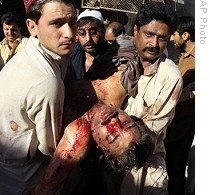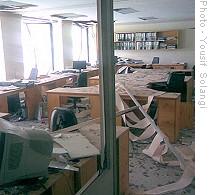Islamabad
28 May 2009
 |
| Wounded man is carried away from blast site following explosion at Qissa Khawani bazaar in Peshawar, 28 May 2009 |
Senior Taliban commander Hakimullah Mehsud told news agencies militants had been planning to target Lahore, the capital of Punjab province, for a long time.
Hakimullah Mehsud is deputy to Taliban leader Baitullah Mesud, believed to have masterminded the assassination of former Prime Minister Benazir Bhutto in 2007. He said Wednesday's attack in Lahore was retaliation and to expect more.
Security lapse
Former military official and defense analyst Talat Masood says the magnitude of the Lahore attack illustrates a serious lapse in security and a lack good intelligence.
"The security culture is not at all compatible with the type of threats that Pakistan is facing in the sense that the police and the security agencies are not truly trained to handle such incidents," he said. "I think it is a question of training, it is a question of equipment, it is a question of culture and mindset."
 |
| The Lahore office of LG Pakistan, an electronics firm after the blast, 27 May 2009 |
Response criticized
Masood says another clue that shows how unprepared Pakistan's security forces are is how they respond after an attack.
"The response after an event, you can see, is extremely chaotic," he said. "Immediately those places must be cordoned off. No outsiders must be allowed. All forensic evidence must be preserved."
Masood adds the public rarely hears or is informed of the perpetrators of such attacks being caught or brought to justice. With the threat of more attacks looming, the Pakistani army says it is up to the task of protecting the nation's cities and is ready to ward off any future terrorist attacks.
Shortly after Wednesday's attack, the government announced rewards for information leading to the capture of 21 Taliban-linked militant leaders, dead or alive.